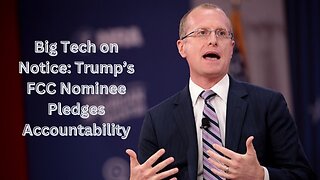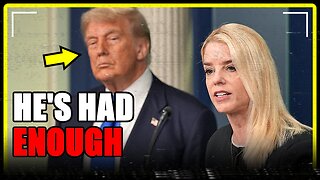Premium Only Content

Elon Musk’s Neuralink Receives FDA Approval for Mind-Blowing Second Brain Chip Trial
Elon Musk’s Neuralink Receives FDA Approval for Mind-Blowing Second Brain Chip Trial
Elon Musk's Neuralink, a pioneering brain-chip startup, has received FDA approval to implant its experimental brain chip, Telepathy, in a second patient. This approval follows complications with the first trial participant, leading to modifications in the device's implantation approach.
Addressing Initial Trial Challenges
In response to issues faced by the first participant, Neuralink has made significant adjustments, including embedding some of the device's ultrathin wires deeper into the brain. These changes aim to enhance the stability and functionality of the device, as reported by sources familiar with the company and a document reviewed by the Wall Street Journal.
Expanding Clinical Trials
Neuralink plans to expand its clinical trials to include 10 participants this year. The primary goal of this project, known as the PRIME Study, is to develop a "fully implantable, wireless brain-computer interface" that allows users to control a computer cursor or keyboard with their thoughts.
Potential Transformative Treatments
This groundbreaking technology holds promise for transformative treatments for various physical disabilities, such as blindness and paralysis, and conditions like autism, depression, obesity, and schizophrenia. Neuralink’s ambition is to unlock new possibilities for individuals with these conditions, offering them a new lease on life.
First Implantation and its Aftermath
The first Telepathy implant was performed in late January on Noland Arbaugh, a 30-year-old quadriplegic. The chip initially allowed Arbaugh to control a computer mouse using his thoughts without any adverse effects. The procedure involved a specially designed robot implanting the coin-sized chip, which has ultra-thin flexible threads, into the brain's movement intention region. This chip records and wirelessly transmits brain signals to an app that decodes movement intentions.
Setbacks and Recovery
However, about a month post-surgery, Arbaugh experienced a significant setback when most of the implanted threads came loose, impairing the device's functionality. This issue highlighted the unpredictability of brain movement within the skull, which exceeded Neuralink’s expectations.
Arbaugh described the emotional rollercoaster of gaining newfound abilities only to lose them shortly after. “I was on such a high and then to be brought down that low. It was very, very hard. I cried,” he shared.
Technical Adjustments and Future Plans
Neuralink has since implemented software updates to restore much of the device’s capabilities, and Arbaugh has demonstrated these improvements in live streams. To prevent similar issues in future trials, the company has received FDA approval to implant the threads deeper into the brain of the second patient, targeting eight millimeters into the motor cortex compared to the three-to-five millimeters used for Arbaugh.
The next procedure is scheduled for June, with eight more participants lined up for trials by year-end. Over 1,000 quadriplegics have registered interest in participating in Neuralink’s trials, reflecting the significant demand and hope surrounding this innovative technology.
For ongoing updates on Elon Musk and Neuralink, visit ElonMuskWatch.com.
-
 1:33
1:33
Conspiracy Chronicle
11 months agoTrump Declares War on Big Tech Censorship with Bold FCC Pick
1551 -
 9:26
9:26
MattMorseTV
1 day ago $41.57 earnedPam Bondi is in HOT WATER.
48K202 -
 16:38
16:38
MetatronGaming
15 hours agoAnno 117 Pax Romana looks INCREDIBLE
76.5K10 -
 3:25:55
3:25:55
DillyDillerson
4 hours agoCAN'T SLEEP | Solo Raids | Trying to level up my workshop | Tips and help are welcome!
4.61K1 -
 LIVE
LIVE
DynastyXL
3 hours ago🔴 LIVE NOW – ARC RAIDING - BADLY! - NEW RUMBLE WALLET - THOUGHTS?
77 watching -
 2:20:13
2:20:13
Side Scrollers Podcast
22 hours agoVoice Actor VIRTUE SIGNAL at Award Show + Craig’s HORRIBLE Take + More | Side Scrollers
70.6K21 -
 LIVE
LIVE
EXPBLESS
1 hour agoShowcasing New Game | (Where Winds Meet) #RumblePremium
48 watching -
 LIVE
LIVE
Boxin
2 hours agolets BEAT! Kingdom Hearts!
38 watching -
 18:49
18:49
GritsGG
18 hours agoI Was Given a Warzone Sniper Challenge! Here is What Happened!
22.2K2 -
 19:02
19:02
The Pascal Show
1 day ago $7.63 earnedNOT SURPRISED! Pam Bondi Is Lying To Us Again About Releasing The Epstein Files
28.9K21